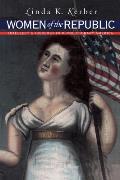“They also kept in place the old law of domestic relations”
The Omohundro Institute’s Uncommon Sense blog just shared Joseph M. Adelman’s interview with Linda K. Kerber, looking back on her 1980 study Women of the Republic: Intellect and Ideology in Revolutionary America.
In that book Kerber set forth the very influential concept of “republican motherhood,” the idea that arose after independence that women had a special responsibility to bring up virtuous sons (and, men conceded, daughters) to preserve the new republic.
Of course, with that great responsibility came…limited power. Here are extracts from Kerber’s remarks about the legal doctrine of coverture, which said that husbands controlled their wives’ property and persons. It could cut both ways:
This Gardiner was a grandson of the Loyalist doctor Silvester Gardiner, born in Britain as the son of an imperial official. He got a little schooling in Boston before 1775, and his family spent the rest of the war in the Caribbean before returning to try to regain the doctor’s property.
Gardiner was high Federalist in politics, which he injected into his sermons. He’s appeared on Boston 1775 only once so far, for complaining about Jeffersonians in 1795. One of Gardiner unhealthy examples of a woman of masculine mind was “Mrs. [Catharine] Macaulay, the author of a dull democratic history.” He praised the “purity of our blood” in New England compared to the “motley rabble, that infest other parts of the Union.”
In sum, Gardiner was no democrat, and seems barely republican. Nonetheless, as first president of the Anthology Society and cofounder of its Athenaeum (both all-male enterprises at the time), he had influence over the early republic’s literary scene.
In that book Kerber set forth the very influential concept of “republican motherhood,” the idea that arose after independence that women had a special responsibility to bring up virtuous sons (and, men conceded, daughters) to preserve the new republic.
Of course, with that great responsibility came…limited power. Here are extracts from Kerber’s remarks about the legal doctrine of coverture, which said that husbands controlled their wives’ property and persons. It could cut both ways:
The common law understanding of coverture meant that women were not guilty of crimes committed under the auspices of their husbands; by extension, women who sought permission to travel to join husbands who were behind British lines were not treated as traitors [though their husbands were].In the interview Kerber quotes a “a well-known Boston minister” warning, “Women of masculine minds have generally masculine manners.” That was the Rev. John Silvester John Gardiner, assistant rector of Trinity Church, in 1801. (Four years later, he became the rector.)
In some confiscation statutes, the dower rights of wives or widows of exiled Loyalists were protected when the state seized their property IF the woman had broken with her husband and enacted her own loyalty to the Republic. Even in states without explicit statutes, courts often acted as though the remaining wife or widow had indeed dissociated herself from her husband and made her own political commitment. . . .
The Founders not only kept in place [and strengthened] the law of slavery; they also kept in place the old law of domestic relations, continuing coverture – aspects of which are still being dismantled in our own time – which, under the guise of “protection,” severely limited the options of the married women [and often, by extension, the not-married woman] to protect their own bodies, to manage their own earnings and to express their political views. Resistance to coverture began with the Revolutionary generation, not with the accomplishment of suffrage in 1920.
This Gardiner was a grandson of the Loyalist doctor Silvester Gardiner, born in Britain as the son of an imperial official. He got a little schooling in Boston before 1775, and his family spent the rest of the war in the Caribbean before returning to try to regain the doctor’s property.
Gardiner was high Federalist in politics, which he injected into his sermons. He’s appeared on Boston 1775 only once so far, for complaining about Jeffersonians in 1795. One of Gardiner unhealthy examples of a woman of masculine mind was “Mrs. [Catharine] Macaulay, the author of a dull democratic history.” He praised the “purity of our blood” in New England compared to the “motley rabble, that infest other parts of the Union.”
In sum, Gardiner was no democrat, and seems barely republican. Nonetheless, as first president of the Anthology Society and cofounder of its Athenaeum (both all-male enterprises at the time), he had influence over the early republic’s literary scene.


